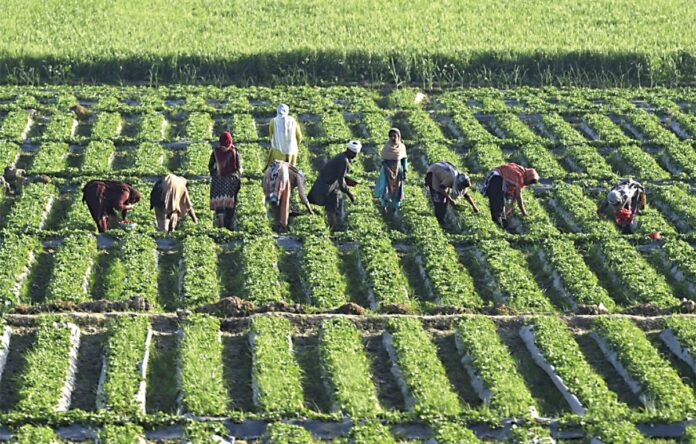ISLAMABAD: A group of young Pakistani agritech entrepreneurs has launched a “first of its kind” initiative called Digital Dera in remote parts of Pakistan’s fertile Punjab province, aiming to empower farmers with the latest agriculture solutions and help them create smart villages.
Earlier this month, while announcing that Pakistani startups had raised a record $305 million in investment globally in 2021, Commerce Adviser Abdul Razak Dawood urged Pakistani entrepreneurs to focus on agritech, which is the use of technology to improve the efficiency and output of agricultural processes.
This month, Tazah Technologies, a Pakistani business-to-business agriculture marketplace launched two months ago to provide innovative supply chain solutions to the agricultural sector, raised $2 million in a pre-seed round led by Global Founders Capital and Zayn Capital.
Digital Dera, or smart village, has been established at village Chak 26-SP in the Pakpattan district of Punjab, Pakistan’s most populous province and its farming heartland. The initiative is currently providing services to more than 2,000 farmers in villages in the area and plans to expand its network through sub-offices in other regions, its founders said.
The project is a joint collaboration of Agriculture Republic and the Internet Society and is backed by Hayat Farms Pakpattan, Accountability Lab and the Pakistan Telecommunication Co. Ltd., the largest telecommunications provider in Pakistan.
“We brought fast-speed internet from the city all the way to the most remote, rural and agriculturally dense region of the country and set up a Digital Dera on Oct. 2 with a technological environment comparable to any city,” Fouad Riaz Bajwa, co-founder of Digital Dera, told Arab News.
“This environment enables free-of-cost access to data and information about farming and agricultural innovations that farmers, youth, and women especially can access.”
Aamer Hayat Bhandara, a young Pakpattan-based farmer who co-founded Digital Dera with Bajwa, said a key part of the project was that a team of experts from the group’s other startup, Agriculture Republic, was always available to guide farmers, provide them with information and connect them to experts through Zoom, Skype and other platforms.
“We are providing digital and online means to increase crop yield, smart manage farms, and promote agriculture products to the world from the heart of Pakistan’s rural center,” he said.
“We are starting weekly training sessions and, one day, will hold women-only sessions. The project will also serve as a digital hub to organize awareness and capacity-building sessions to educate youth and small farmers on precision agriculture, food security and climate change policies.”
Speaking to Arab News, Dr. Mohammed Anjum Ali, director-general for agriculture in Punjab, said that Digital Dera was the first startup of its kind to provide farmers a physical space as well as round-the-clock advice from agritech experts.
“This is a private sector initiative. It was installed in an area where there was no internet available, but it was a very fertile and high-value crops area,” he said. “We aimed to cooperate with them and are planning to launch such initiatives in other parts of the country as well.”
Waqar Ahmed, a general manager for digital services at Pakistan Telecommunication Co. Ltd, said the company has decided to provide internet and backend services to the startup so that farmers could benefit and enhance their productivity.
“We will partner with other such initiatives and expand the outreach of internet-based solutions to farmers. Our aim is to contribute to bringing information to the farmer’s doorstep,” Ahmed told Arab News.
Nadeem Nasir, a spokesperson for Ignite, a national technology fund that supports the establishment of startups in Pakistan, said what was unique about Digital Dera was that they had established a digital hub right in the middle of a farming community.
“This center can be beneficial for other agritech startups as well,” Nasir said. “They can use this space to educate and train farmers about their own applications and other products.”

